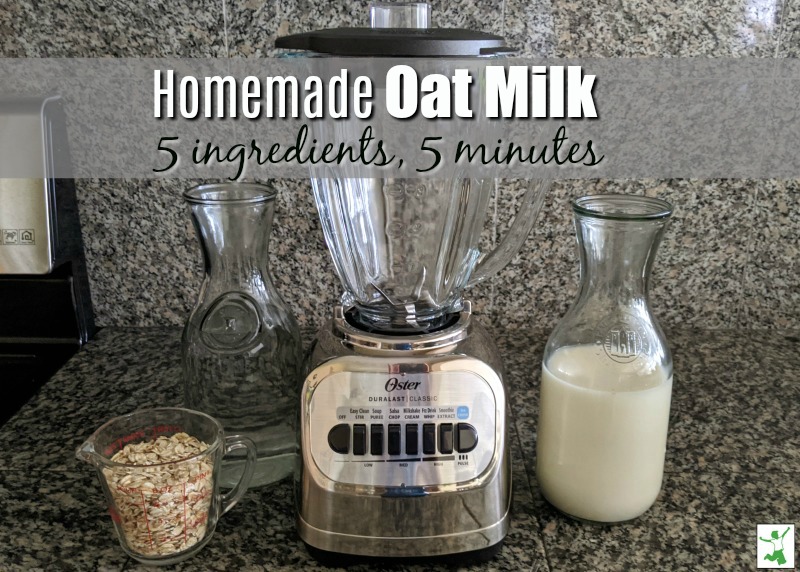
Oat milk has a couple of big things going for it as a milk substitute. First of all, it is very mild in flavor and hence, the best tasting (in my opinion), alternative to dairy in lattes and other dishes.
Secondly, it tastes mildly sweet without any additional sugar.
These two reasons are why I believe the demand for oat milk is off the charts recently both at coffee shops and at the store. This stuff seems to be everywhere!
Commercial Oat Milk Dangers
Before you run out and buy a carton, however, note that there are two big negative reasons against consuming commercial oat milk.
First and foremost, it is off the charts high in phytates because raw oats are naturally very high in this anti-nutrient.
Of course, food corporations generally don’t recognize this fact let alone do anything about it during the manufacturing process. They simply make it, market it slickly and aggressively, and report awesome earnings quarter after quarter to their shareholders.
Toxic Packaging
Secondly, manufacturers flash pasteurize oat milk before packaging. This means boiling hot liquid is poured into the container at the time the package is sealed to sterilize it.
Most people don’t realize that cartons have a thin layer of plastic lining the inside. So, tetra-paks are no better than plastic bottles. Both packaging methods involve very hot liquid contacting plastic for many minutes until the liquid cools down inside the container.
Leaching of hormone-disrupting toxins into the oat milk absolutely occurs as a result of this process no matter what type of plastic the manufacturer uses.
This same problem plagues nearly all store-bought milk alternatives, by the way.
Only a few brands actually care enough about their customers to cool down the liquid and bottle at a safe temperature to ensure their products are non-toxic (such as this one).
Ultimately, it’s up to you to educate yourself not just about ingredients but also processing and packaging. For example, the ingredients of several oat milk brands I checked looked fine on the surface. But, they absolutely go on the “never buy” list when you factor in manufacturing and packaging methods.
Knowing about the high level of phytates combined with the toxic packaging signals “do not buy” to the savvy consumers.
My Experience Drinking Store Oat Milk
When I decided to figure out a way to make homemade oat milk for those of you who enjoy it and really need to use it because of a true dairy allergy (not a pasteurization allergy), I realized I needed to (ugh) try the commercial stuff to see how it smelled, tasted, etc.
So, I bought what was the best brand I could find out there. And, I have to tell you, I got an almost immediate (as in, within 5 minutes) stomach ache from consuming a small glass!
This happened every single time I tried it whether alone as an ingredient in one of my homemade lattes.
The lattes tasted fine, but I was nearly doubled over with stomach cramps from the antinutrients in the oat milk.
I have pretty much an iron stomach too. So for something to cause me tummy pain, it’s got to be virtually indigestible.
To those who say, “I drink store oat milk all the time with no problems”, I would suggest that your stomach may be so beaten up that it isn’t even sending pain signals to your brain anymore.
DIY Oat Milk (all the benefits, none of the downside)
The great news is that homemade oat milk is a cinch to make. The trick is to use sprouted rolled oats instead of regular rolled oats used by food manufacturers for the commercial stuff.
Sprouted oats have little to no phytic acid as the sprouting process neutralizes them.
Soaking rolled oats overnight like the recipe for oat water in the Nourishing Traditions cookbook, unfortunately, results in slimy oat milk.
Of course, sprouted oats can’t be eaten raw … they need to be cooked thoroughly first. But, the oat milk-making process removes all the hard to digest residue leaving just the oat “milk” behind.
Drinking sprouted oat milk didn’t give me any digestive upset whatsoever!
You will notice that sprouted oat milk is a bit lighter in color compared to commercial brands. It also tastes more oat-y for lack of a better word…this is a good thing! In other words, it is fresher tasting than store-bought.
Try it as a milk substitute in your favorite dairy-free recipes!
I hope you enjoy it 🙂
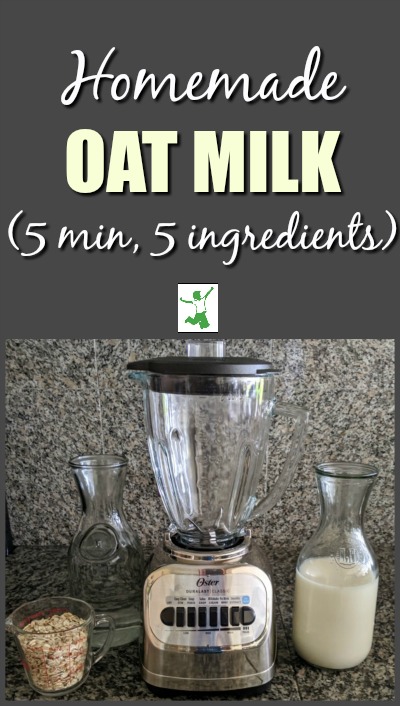
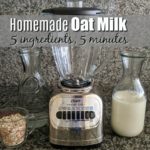
Homemade Oat Milk
Homemade sprouted oat milk that is easy to digest and more nourishing than brands from the store. Quick to make in five minutes with only five ingredients!
Ingredients
- 1 quart filtered water
- 1 cup sprouted rolled oats
- 1 scoop collagen peptides
- 2 Tbl avocado oil
- 1 smidgen sea salt
Instructions
-
Add water and sprouted rolled oats to a blender.
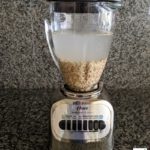
-
Blend on high for 30 seconds.
-
Strain liquid into a bowl through a clean white flour sack cloth or dishtowel. Toss or compost sieved oat fragments.
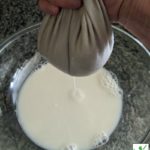
-
Stir in oil and peptides into the filtered oat milk until mixed well.
-
Pour into a glass container and refrigerate. Homemade oat milk lasts about 5 days.
-
Blend well before serving for best taste and consistency.
Recipe Video
Recipe Notes
Do not use steel cut oats or oat groats for this recipe. Rolled oats definitely produce the best results.
Do not blend for more than about 30-45 seconds or the oat milk turns out a bit slimy.
A smidgen is 1/2 pinch or 1/32 of a teaspoon.








Link to the avocado oil comes up with nothing on Amazon. Do you have a recommended avocado oil?
I’ve started soaking all my beans, legumes and grains according to your instructions and I’m coming along well. Recently I bought a large amount of organic rolled oats (unsprouted) on sale, thinking I could make oatmilk from them, but from this recipe (and another of your recipes calling for a grain flaker which I don’t have access to), I would like to ask if I can sprout my rolled oats and then use this recipe to make oatmilk.
Thank you very much for all your wonderful recipes and advice!
Rolled oats won’t sprout. You have to sprout oat groats to make soaked oat milk. https://www.thehealthyhomeeconomist.com/soaked-oat-milk/
Got it. Thank you again very much.
when grains are soaked overnight to reduce phytates are you supposed to discard the soaking water,i would imagine the phytates would be in the soaking water and using it would not be good